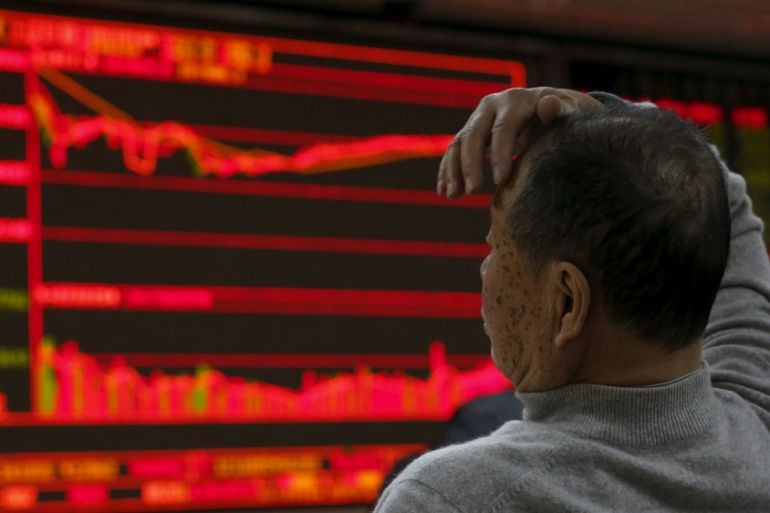Chinese markets suspended as shares plunge
Seven-percent drop in stock prices attributed to weak factory data, as China’s economy continues to struggle.

Chinese stock markets have tumbled seven percent in their opening session of 2016, forcing exchanges to suspend trading for the first time.
The plunging share prices on Monday came as weak factory activity surveys and falls in the yuan added to concerns about the struggling economy.
Keep reading
list of 4 itemsShip that caused deadly Baltimore Key bridge collapse towed to port
‘Why should we vote?’ India’s jute workers blame politicians for woes
California farmworkers cheer new housing in town scarred by mass shooting
Early losses quickly snowballed in the afternoon, with trading suspended around 05:30 GMT, about 90 minutes before the regular close.
|
|
Selling intensified after a brief 15-minute trading halt early in the afternoon when main indices had shed five percent, and activity in Shanghai and Shenzhen was halted for the day soon after.
It was the first day that the China markets’ so-called “circuit breakers”, intended to curb volatility, had been in effect.
Al Jazeera’s Adrian Brown, reporting from Beijing, said the plunging share prices were “another reminder that China’s economy is continuing to splutter”.
“It is an economy weighed down by two problems at the moment: excessive government debt and currency flight,” he said.
“The Chinese who can get their money out of the country continue to do so. They no longer have any faith in the stock market or the property market and they are voting with their feet.”
Beijing residents hope China Dream remains on track
The blue-chip CSI300 index .CSI300 ended down seven percent at 3,470.41 points, while the Shanghai Composite Index lost 6.9 percent to 3,296.66.
Hong Kong’s Hang Seng Index was pulled down 3 percent in response.
Investors also dumped stocks before the imminent expiration of a share sales ban on listed companies’ major shareholders, which had been imposed during the market crash last summer.
“The slump apparently triggered intensified selling, while the triggering of the circuit breaker seems to have heightened panic, as liquidity was suddenly gone and this is something no one has experienced before,” said Gu Yongtao, strategist at Cinda Securities.
“It was a stampede.”
NOTES FROM THE FIELD – CHINA CORRESPONDENT ADRIAN BROWN
Monday was all about symbolism because this was the first trading day of the year.
But a new circuit-breaker system, designed to control market volatility, actually appears to have had the reverse effect.

The temporary closure actually created more panic which led to the Blue Chip Index having to halt trading for the rest of the day when it fell below by almost seven percent in Shanghai and more than eight percent in Shenzhen.
So why the downbeat investor sentiment?
A private survey shows factory output has dropped for the tenth straight month. Demand for much of what China makes is falling because of the slowing global economy.
And that’s happening because economic growth here is slowing – so it’s a vicious circle.
And in the middle of all this, China’s leaders want to move the economy away from heavy industry. They want an economy that is service led.
The stock market is an indicator of the health of China’s economy. But it’s not the only indicator.
It is, however, another reminder that the world’s second largest economy is continuing to splutter. 2016 could be another rocky ride.